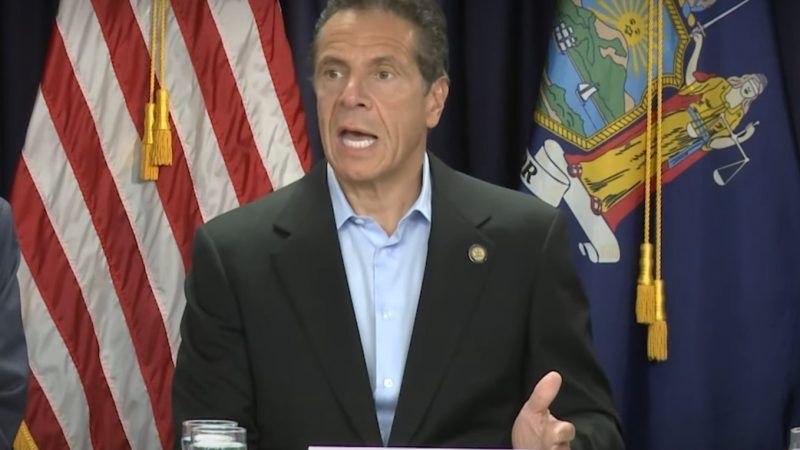The Alarming Epidemic of Misguided Meddling With E-Cigarettes
Banning the flavors that former smokers overwhelmingly prefer is a strange way to protect public health.

Banning flavored e-cigarettes is all the rage among politicians these days. It's an alarming trend that poses a clear and present danger to public health.
The epidemic of misguided meddling began earlier this month when Michigan Gov. Gretchen Whitmer announced that she planned to unilaterally criminalize the sale of e-cigarettes in flavors other than tobacco. The contagion quickly spread to the White House, where President Donald Trump said his administration plans to impose a similar ban at the federal level; New York, where Gov. Andrew Cuomo this week declared an "emergency" ban; California, where Gov. Gavin Newsom said he would copy Cuomo if it were legally feasible; and Chicago, where Mayor Lori Lightfoot called for legislation aimed at closing "the gateway" to adolescent nicotine addiction.
The official justification for these measures is recent increases in vaping among teenagers, who overwhelmingly prefer the flavors that Whitmer et al. want to ban. Yet those flavors are also very popular among adults who have switched from smoking to vaping, a far less dangerous source of nicotine.
In a 2018 survey of 69,000 adult vapers who were asked which flavors they used regularly, just 8 percent said "tobacco," while 83 percent said "fruit," 71 percent mentioned flavors in the "dessert/pastry/bakery" category, 13 percent said "menthol," and 10 percent picked "mint/wintergreen." Eighty-one percent of the respondents described themselves as former smokers, 13 percent were still smoking, and 5 percent had never smoked. Among the former smokers, 75 percent had started vaping when they quit.
Surveys of former smokers find that flavor variety plays an important role in the process of switching to vaping. The Food and Drug Administration (FDA) has acknowledged "the role that flavors…may play in helping some smokers switch to potentially less harmful forms of nicotine delivery."
Former FDA chief Scott Gottlieb, notwithstanding his concerns about underage vaping, recognized the enormous harm-reducing potential of e-cigarettes, describing them as a "tremendous public health opportunity." Yet the FDA now plans to ban nearly all of the vaping products used by former smokers, which is likely to drive many of them back to a much more dangerous habit while deterring current smokers from making a switch that could save their lives.
The evidence suggests that vaping is replacing smoking among teenagers as well as adults. The prevalence of cigarette smoking among high school students has fallen to record lows as the prevalence of vaping has increased, and a 2018 study found that the decline in smoking among teenagers and young adults accelerated as vaping became increasingly common.
Some public officials and journalists have insinuated that legal e-cigarettes have something to with recent reports of severe respiratory illnesses among vapers. Yet in the vast majority of those cases, the patients had vaped black-market cannabis products.
The leading theory among state and federal investigators is that the illnesses are caused by additives or contaminants in those products, and possibly also in black-market nicotine e-liquid. One plausible culprit is vitamin E acetate, which was detected in most samples of THC fluid tested by the FDA and New York's state lab.
"The e-cigarettes and the vaping devices are often used to vape other substances," such as "THC" and "vitamin E acetate," Cuomo noted this week. "And many of these other products have no controls on them whatsoever, the so-called counterfeit products. They're not cleared by the FDA. There's been no analysis of them at all. So vaping is dangerous."
Under the cover of "vaping is dangerous," Cuomo is imposing a ban that will lead to greater use of "counterfeit products" that are "not cleared by the FDA," have not been analyzed, and "have no controls on them whatsoever." How does that make sense?
Selling e-cigarettes to minors is already illegal. Instead of enforcing age restrictions, the prohibitionists want to prevent adults from obtaining the vaping products they demonstrably prefer, which will predictably result in more smoking-related disease and death. That's a pretty strange way to protect public health.
© Copyright 2019 by Creators Syndicate Inc.


Show Comments (33)